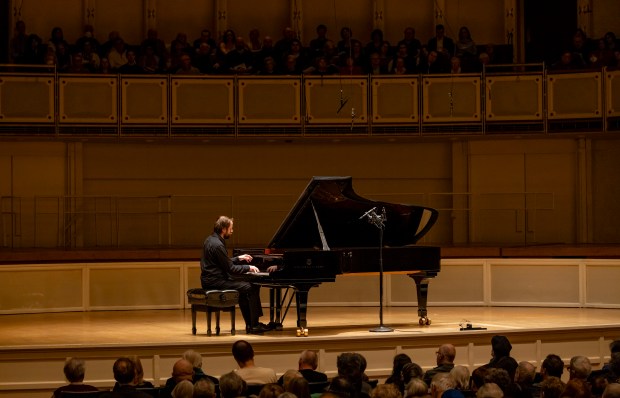At 33, Daniil Trifonov has spent his entire adulthood in the spotlight. After sweeping both the Tchaikovsky and Rubinstein piano competitions in 2011 — and finishing third at the International Chopin Piano Competition the year before that — the Russian musician, then still a student at the Cleveland Institute of Music, was flung into superstardom.
Trifonov’s dizzying technique and maverick interpretations have assured he’ll remain there. Look no further than his recent Deutsche Grammophon tribute to his adopted home country: “My American Story: North,” pairing concertos by George Gershwin and Mason Bates, solo pieces by Corigliano and Copland, and jazz standards and film music selections. There’s even a bonus track from the video game “Skyrim” — Trifonov has been known to play video games to take the edge off performing — and a take on John Cage’s “4’33”” recorded on a New York subway platform. (The album’s sequel, “My American Story: South,” is forthcoming, with pieces from Latin and South America; Trifonov’s wife, who he met at the Cleveland Institute of Music, is from the Dominican Republic.)
But for his ritzy Deutsche Grammophon contract and high-flying PR team, fame is not a garment Trifonov wears comfortably. He’s painfully shy, as anyone who’s seen him perform can attest. He takes the stage with an unvarnished aloofness, squirming under repeated curtain calls. Offstage, it’s the same. Press interviews seem to physically pain him, as though frittering away time that could be better spent behind the comforting barricade of a keyboard.
That makes Trifonov, on balance, a pretty odd pick for the Chicago Symphony’s artist-in-residence — though he holds the same position with the Czech Philharmonic this season and has already served out a residency at the New York Philharmonic. He has the sheer wattage of his predecessor, violinist Hilary Hahn, and gets a similar allotment of season appearances: he returns in May to play with music director designate Klaus Mäkelä and host a duo recital with violinist Leonidas Kavakos. But Trifonov mostly eschews the extracurricular activities and outward-facing charisma the CSO’s ambassadorial role would seem to demand. Nor did he come into the yearlong appointment toting any singular programming ideas like Hahn’s concerts for babies or concerto masterclass for rising conductors.
Instead, this week, Trifonov came bearing a challenge to a music industry that’s become a whole lot more “industry” than music. A disarmingly interior solo recital on Sunday and fastidious masterclass on Monday both reaffirmed the impression he’d left during a backstage interview at Orchestra Hall earlier this year, still streaked with sweat from a performance of Bates’ piano concerto. For much of the conversation — Why orchestra residencies? Why now? Why the CSO? And how about that Deutsche Grammophon release? — Trifonov was mostly terse, angled 90 degrees away and gaze locked on the green room wall.
Then, the conversation pivoted to what he’d just played. Trifonov is a composer himself, and a fine one, too; when asked to sound off on the Bates opus, composer to composer, he unfurled like a frond. His knees swiveled, then his eyes.
“When I received the score, I didn’t change anything, actually,” he said. “The orchestration itself is excellent; it’s very well balanced. It didn’t take me a long time to learn, because there is quite a lot of logic in the way it’s written.”
One got the sense he could keep going, unbidden. But Trifonov was restless. He had repertoire to study, places to be. And the irony about the CSO’s “artists-in-residence” — and other orchestras’ for that matter — is that they don’t stick around too long.
That Trifonov would hail the “logic” of Bates’ concerto says everything about his approach to the piano. There’s a graceful economy to Trifonov’s performances — not in their emotional scale, which is grand, but in their obsessive attention to how each note, chord and gesture relates naturally to the whole. “Cerebral” doesn’t do him justice: When asked about his most fatal onstage error, Trifonov once told an interviewer he’d started a piece in the wrong key and “had to modulate (his) way” back to the correct one.
Trifonov’s concerto appearances, here and elsewhere, have courted the same comparisons to demonic possession that once trailed Liszt and Paganini. His whole body writhes, long hair hanging in curtains around his face. His hands — elegant, long, vampirically pale — become blurs on the keyboard.
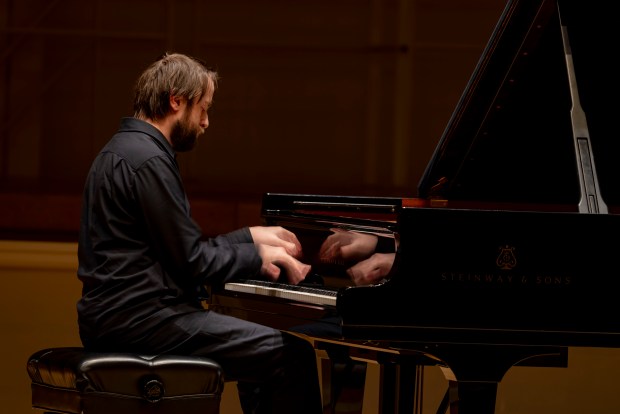
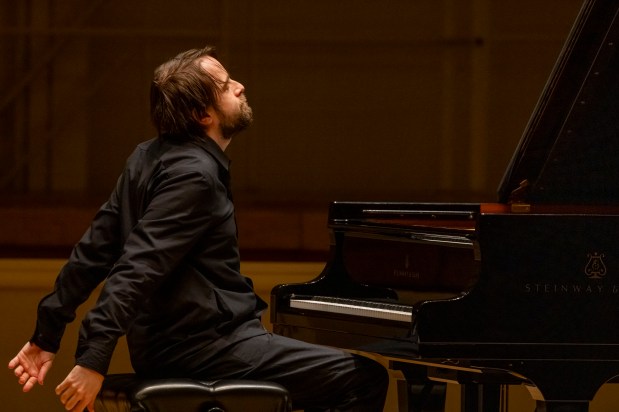
Sunday’s Trifonov was different. After the usual, stoic bow-nods, he played much of the recital program with the ramrod coolness of a government typist. The expression came from his arms, elbows, wrists, all bonelessly supple.
The program was a notch off-center, but a Trifonov bullseye: B-side Tchaikovsky, a smattering of Chopin waltzes and the Barber sonata, another chapter in Trifonov’s American story but relayed with Prokofiev and Shostakovich’s gristle. Tchaikovsky’s symphonic ambitions bridle against their keyboard constraints in his early C-sharp sonata; Trifonov tapped both fluidity and clarity out of the bloat. Mikhail Pletnev’s arrangement of the composer’s “Sleeping Beauty,” ending the program, was its mirror image, its orchestral aspirations realized but crammed back into a pianistic mold. Using its new form to impose fresh contours and tempi, Trifonov transformed the stalwart into a “Pictures from an Exhibition”-esque set of character pieces.
After the performance, a packed Orchestra Hall urged Trifonov out again and again. Trifonov reluctantly obliged the curtain calls, but not the cheers of “encore!” He retreated backstage and the house lights came up. He had a post-recital Q&A with donors to attend — and that was a big enough ask as it was.
Can Trifonov’s brilliance be taught? Trifonov was tasked to at least try the following day, when he met with three students from DePaul, Roosevelt and Northwestern’s schools of music at DePaul’s Allen Recital Hall.
In a phone call the month before, Cristina Rocca, the CSO’s vice president of artist planning, admitted she’d never seen Trifonov teach before inviting him to become the CSO’s artist-in-residence. But when she raised the notion of masterclasses with him, Trifonov unfurled in much the same way he had during our green room conversation, peppering her with questions about expectations and repertoire.
“He gives this impression he lives in a world of his own,” she said. “But he’s interested in the practicalities.”
So it was on Monday. Semi-public masterclasses are ungainly beasts, sometimes devolving into story sessions or empty affirmations that are plainly for the benefit of the audience rather than the student. Others give it their best shot but are simply too general to be helpful, as was Hahn’s masterclass two seasons ago at People’s Music School in Uptown.
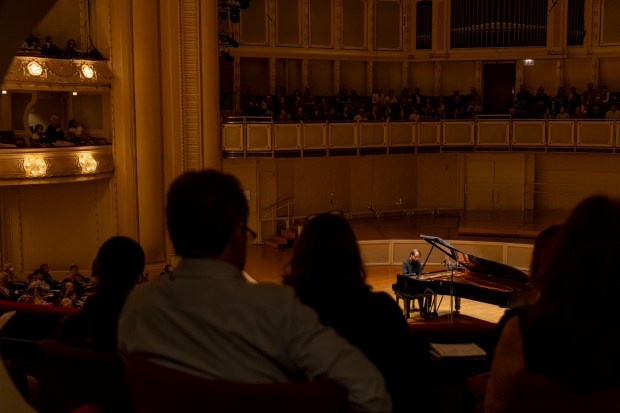
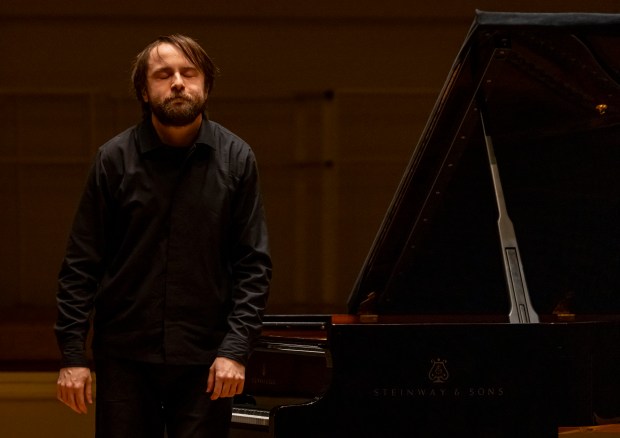
Trifonov, as ever, didn’t sign up for pleasantries. He is a phenomenal teacher, which is to say an exacting one. (A lucky Northwestern student got a “wonderful” from him after her performance, which, coming from Trifonov, proved to be high praise.) He listened to each student play through their complete selections uninterrupted, eyes flicking between the score and their hands. Then, he worked through the score with a fine-toothed comb, just a few chords at a time — pointing out relationships between inner voices, flagging cadential motions the students had skated over, offering suggestions about articulation and character.
Never did he sermonize about the history of the piece. Absent, too, was the usual call-and-response about what the student was seeking out of their interpretation. It was as though Trifonov and the student were disassembling a Lego sculpture together, Trifonov merely pointing out which pieces made the snuggest fits. Ultimately, he let the students reassemble themselves — and show, rather than tell him, what they were seeking from their interpretation.
“There’s a contrast between these two characters that should be present,” he told a Roosevelt student early on as they pored over the opening bars of Chopin’s third sonata together. Trifonov demonstrated his casting of those characters, then the student tried his own.
The masterclass revealed as much about Trifonov as a pianist as it did Trifonov as a teacher. He urged the Chopin student to think of having “warm wrists” and the DePaul representative to toss out the tension in his arms — the same pliancy that makes a boneless marvel out of his. Thinking orchestrally yet again with the Northwestern student, Trifonov pointed out a dotted figure in Robert Schumann’s first sonata that was similar to the theme of Scriabin’s “Poème de l’extase,” and thus subject to the same pitfalls.
The masterclass was supposed to run for two hours. Trifonov went more than 30 minutes over. The CSO’s anti-artist-in-residence may be everywhere, but when he’s here, we get all of him.
Hannah Edgar is a freelance critic.
The Rubin Institute for Music Criticism helps fund our classical music coverage. The Chicago Tribune maintains editorial control over assignments and content.
“Mäkelä & Trifonov,” May 1-4, 2025, at Symphony Center, 220 S. Michigan Ave., tickets $75-$399 at cso.org
“Leonidas Kavakos & Daniil Trifonov,” 3 p.m. May 9, 2025, at Symphony Center, 220 S. Michigan Ave., tickets $49-$199 at cso.org


